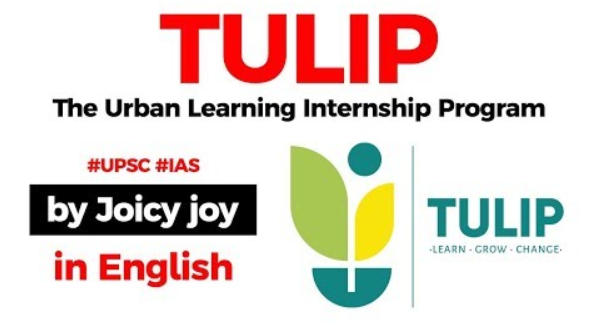Table of Contents
- Recently, the Ministry of Human Resource Development, the Ministry of Housing & Urban Affairs, and All India Council for Technical Education (AICTE) have jointly launched an online portal called The Urban Learning Internship Program (TULIP).
- Aim: To provide internship opportunities to 25,000 fresh graduates in all Urban Local Bodies (ULBs) and Smart Cities across the country.
- Concept: TULIP has been conceived pursuant to the Budget 2020-21 announcement under the theme ‘Aspirational India’ which laid emphasis on changing the approach of education from ‘doing by learning,’ to ‘learning by doing’.
- Area of Work: The internship opportunities will be provided for ‘Smart City’ projects which range from positions in urban planning, water supply, waste management, slum improvement and digital governance among others.
- Eligibility: Applicants must be Indian citizens who have completed their final year of college within the last 18 months and have a degree of B. Tech, B planning, B. Arch, BA, BSc, BCom, LLB.
- Duration: Internship durations can range from eight weeks to one year.
- Benefit:
- Enhance the value-to-market of India’s graduates
- Create a potential talent pool in diverse fields.
- Benefit ULBs and smart cities.
- It will lead to infusion of fresh ideas and energy with engagement of youth in co-creation of solutions for solving India’s urban challenges.
- The TULIP’s launch is also an important stepping stone for fulfillment of MHRD and AICTE’s goal of 1 crore successful internships by the year 2025.
Smart City Mission
- Ministry of Housing and Urban Affairs
- To drive economic growth and improve the quality of life of people
- By enabling local development and harnessing technology as a means to create smart outcomes for citizens.
- Objective: To promote cities that provide core infrastructure and give a decent quality of life to its citizens, a clean and sustainable environment and application of Smart Solutions.
- Coverage and Duration: The Mission covers 100 cities for the duration of five years starting from the financial year (FY) 2015-16 to 2019-20.
- Financing: It is a Centrally Sponsored Scheme.
CONCLUSION
- Despite having a large number of skill development initiatives, the skill gap remains a big challenge in India.
- There is a need to enhance the breadth and depth of these initiatives.
- The disconnect between education and industry broadly because of the traditional approach in education is another important aspect.
- Initiatives like TULIP is a welcome intervention specifically focusing on these aspects.
Latest Burning Issues | Free PDF






















 WhatsApp
WhatsApp